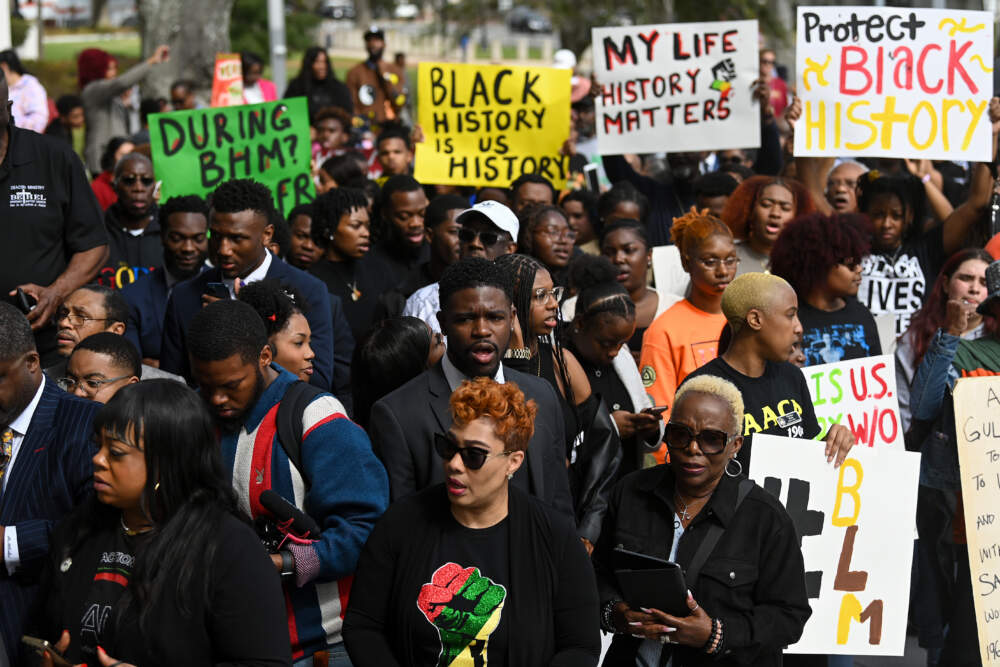Advertisement
Commentary
When we teach Black history, facts matter — and so does narrative

Last month, the Florida State Board of Education unanimously approved new African American history education standards for K-12 public schools. Among the many alarming directives: middle school students should be instructed that enslaved people “developed skills which, in some instances, could be applied for their personal benefit.” The new guidelines also implement enslaved people as perpetrators of violence during race massacres.
The curriculum updates were implemented to meet requirements for Gov. Ron DeSantis’s 2022 “Stop W.O.K.E. Act,” a Republican-led state law prohibiting workplace or school instruction teaching that people are “inherently racist, sexist, or oppressive, whether consciously or unconsciously.” Many scholars, educators, and even Vice President Kamala Harris have been swift to condemn Florida’s new education standards, and they can speak more closely to the historical inaccuracies than I can. But these standards are not just about facts and politics.
This new curriculum is about controlling a narrative.
Once rooted, narratives inform how we understand and navigate the world.
As a cultural sociologist, I examine narratives — the collection of themes, values and ideas permeating the stories we tell. Narratives do not exist in a vacuum. Instead, they are repeated across various social contexts, creating broader belief systems that lodge in our minds. Once rooted, narratives inform how we understand and navigate the world. Narratives can also evoke powerful emotions that can be mobilized for cultural and political use. Barack Obama’s 2008 presidential campaign, for example, effectively mobilized voters around an emotional narrative of hope, whereas Donald Trump’s 2016 campaign successfully tapped into emotional narratives of fear, anger and frustration.
To understand the power of narratives, just look at Americans’ feelings about Black history. Recent studies have found that 58% to 67% of Americans believe that our country’s history of slavery impacts the position of Black people today, and a poll earlier this year suggested that 9 in 10 American adults think schools have a responsibility to teach children about slavery. These results are promising, even progressive. Until you switch up the narrative.
A March 2023 Ipsos poll tested two narratives about Black history. Half of the survey respondents were asked whether they supported or opposed teaching “the ongoing effects of slavery and racism in the United States in public schools.” The other half were asked whether they supported or opposed teaching critical race theory. People in the first group overwhelmingly (72%) favored teaching about the effects of slavery and racism, yet over half (53%) of people in the second group were opposed to teaching critical race theory.
The problem with racist narratives is that, like any other cultural narrative, they are sticky.
So how do we know these poll results aren’t just about political beliefs? Because nearly half of Republicans were in favor of teaching the legacy of slavery. Forty-six percent of Republicans in the first group supported teaching about racism, yet when the question is reframed as teaching critical race theory, a whopping 81% of Republicans in the second group opposed it. In other words, people’s answers change when you alter the narrative.
It might be tempting to dismiss the significance of Florida’s controversial new guidelines as a one-off in an otherwise robust Black history curriculum. Florida is one of just 12 states with a K-12 Black history mandate. A quick skim of the standards includes mention of significantly more historical events and prominent figures than I ever encountered in my mid-2000s New York State social studies curriculum. That’s something, right?
Florida’s new education standards are not a one-off. Rather, they are one piece of the broader “War on Woke” narrative pervading culture war politics across the United States. As of October 2022, 25 states had passed 64 laws reshaping and restricting K-12 curriculum. Nearly 500 jurisdictions — in 49 states — are proposing restrictions on critical race theory curricula in public schools and universities. Last year, a record 2,571 books were targeted for censorship, including many that focused on the history of racism in the United States. As a result, one in four teachers report altering their lesson plans because they feel direct pressure from parents or changing laws to limit or altogether remove instruction on race and racism.
Whereas these recent educational reforms have focused on removing instruction about racism, Florida’s new curricula directives signal a shift towards introducing new narratives. Though this may be the first, I anticipate it will not be the last racist narrative we see shoe-horned into public school curricula amid the current Woke War.
The problem with racist narratives is that, like any other cultural narrative, they are sticky. Some of them stick around for hundreds of years, outliving the laws they promoted and the politicians who once spoke them. How do we know? Because not even Florida’s new education standards are new — Southern Antebellum era anti-abolitionists preached the “benefits of slavery” narrative centuries before Florida’s State Board of Education unanimously instated it.
